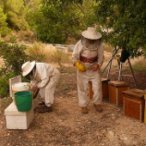
25 de marzo de 2009 | Entrevistas | Bosques y biodiversidad
Poisoned Honey
Uruguayan beekepers denounce massive death of hives as a consequence of pesticide Fipronil.
Length: 2:58 minutes
Descargar: MP3 (2.1 MB)
Interview with Ricardo Carrera. Over five thousand dead hives and millions of bees contaminated is the result of the use of this product which has been banned in several countries of the world.
A campaign has been carried out for months. The problem is that as a result of the strong draught which affected Uruguay this summer, the population of locusts has increased, decimating great part of the fields used for cattle.
For this reason, Uruguayan authorities opened the door to fipronil, a systemic pesticide which affects the entire biological chain, and even reaches food.
Its implementation to combat locusts has had extremely negative impacts on bees, causing the massive death of hives, and a reduction of the production of the survivor, told beekeeper Ricardo Carrera to Real World Radio.
“So far we´ve counted the death of 5 thousand hives” Carrera said “and there have been strong reductions in the production of others”. Fipronil and similar products were banned in Italy, Germany, the UK and other countries due to its systemic nature. This means the active principle, even though it is applied at seed level, reaches the plant, the flower, fruit and seeds, and is transfered to cattle, for instance, and also bees.
In France, fipronil was banned in 2004.
Uruguayan beekepers have made reference to the lack of attention their demands have had among the authorities, despite the fact that a public-private commission (the Honorary Commision of Beekeeping Development) has warned on the negative effects of fipronil for this sector of primary production.
Carrera stated that a range of four hectares without hives must be kept from the area which has had fipronil applied. This causes that the polonization process of any crop near a field which has been sprayed with fipronil will be slowed down, ruining crops and damaging producers of other sectors and the environment in general due to the leaking of this substance to water sources, causing the death of the aquatic fauna.
Fipronil was developed by French laboratory Rhone-Poulenc by mid-80s, and it was then sold to German corporation BASF. In Uruguay it is marketed by German Bayer, although currently there are versions of the product coming from China.
Bayer has even stated to the beekeepers who have been mobilizing that the company would be willing to take the product out from the Uruguayan market before being involved in a campaign of denunciations on the effects of fipronil, stated Carrera.
Due to the numerours protests, this week the Uruguayan government established limits to the use of fipronil as insecticide, although it continues authorizing its use against ants in the vast forest plantations which prevail in the Uruguayan landscape, which makes the problem for beekeepers far from being solved.








